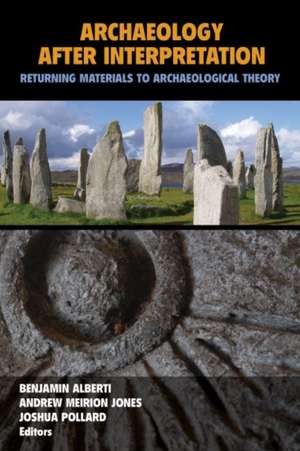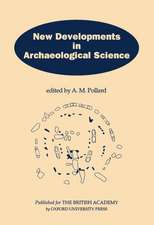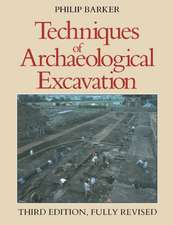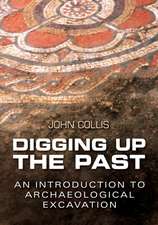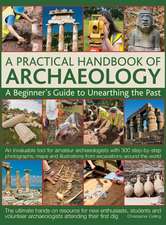Archaeology After Interpretation: Returning Materials to Archaeological Theory
Editat de Benjamin Alberti, Andrew Meirion Jones, Joshua Pollarden Limba Engleză Paperback – dec 2015
| Toate formatele și edițiile | Preț | Express |
|---|---|---|
| Paperback (1) | 399.03 lei 6-8 săpt. | |
| Taylor & Francis – dec 2015 | 399.03 lei 6-8 săpt. | |
| Hardback (1) | 1066.55 lei 6-8 săpt. | |
| Taylor & Francis – 31 dec 2013 | 1066.55 lei 6-8 săpt. |
Preț: 399.03 lei
Nou
Puncte Express: 599
Preț estimativ în valută:
76.36€ • 78.78$ • 64.63£
76.36€ • 78.78$ • 64.63£
Carte tipărită la comandă
Livrare economică 05-19 martie
Preluare comenzi: 021 569.72.76
Specificații
ISBN-13: 9781611323429
ISBN-10: 1611323428
Pagini: 418
Ilustrații: 50 figures, notes, references, index
Dimensiuni: 152 x 229 x 28 mm
Greutate: 0.68 kg
Ediția:1
Editura: Taylor & Francis
Colecția Routledge
Locul publicării:Oxford, United Kingdom
ISBN-10: 1611323428
Pagini: 418
Ilustrații: 50 figures, notes, references, index
Dimensiuni: 152 x 229 x 28 mm
Greutate: 0.68 kg
Ediția:1
Editura: Taylor & Francis
Colecția Routledge
Locul publicării:Oxford, United Kingdom
Cuprins
Chapter 1 Archaeology after Interpretation, Andrew Meirion Jones, Alberti Benjamin; Part I Relational Ontologies, Benjamin Alberti; Chapter 2 Archaeology and Ontologies of Scale: The Case of Miniaturization in First-Millennium Northwest Argentina, Benjamin Alberti; Chapter 3 Transmorphic Being, Corresponding Affect: Ontology and Rock Art in South-Central California, David W. Robinson; Chapter 4 Carnival Times and the Semiopraxis of the Snake: Mining and the Politics of Knowledge, Alejandro Haber; Chapter 5 Unstable Contexts: Relational Ontologies and Domestic Settings in Andean Northwest Argentina, Andrés Gustavo Laguens; Part II Working with Materials, Andrew Meirion Jones; Chapter 6 Deception and (Mis)representation: Skeuomorphs, Materials, and Form, Chantal Connetter; Chapter 7 Designing with Living: A Contextual Archaeology of Dependent Architecture, Lesley McFadyen; Chapter 8 Archaeological Complexity: Materials, Multiplicity, and the Transitions to Agriculture in Britain, Andrew Meirion Jones, Emilie Sibbesson; Part III Assembling the Social, Joshua Pollard; Chapter 9 From Ahu to Avebury: Monumentality, the Social, and Relational Ontologies, Joshua Pollard; Chapter 10 Fields of Movement in the Ancient Woodlands of North America, Sarah E. Baires, Amanda J. Butler, B. Jacob Skousen, Timothy R. Pauketat; Chapter 11 Objects and Social Change: A Case Study from Saxo-Norman Southampton, Ben Jervis; Chapter 12 Dynamic Assemblages, or the Past Is What Endures: Change and the Duration of Relations, Chris Fowler; Chapter 13 Assembling Bodies, Making Worlds: An Archaeological Topology of Place, Marcus W.R. Brittain; Part IV Beyond Representation, Andrew Meirion Jones; Chapter 14 Archaeological Visualization and the Manifestation of the Discipline: Model-Making at the Institute of Archaeology, London, Sara Perry; Chapter 15 Articulating Relations: A Non-Representational View of Scandinavian Rock Art, Fredrik Fahlander; Chapter 16 Materials of Affect: Miniatures in the Scandinavian Late Iron Age (AD 550-1050), Ing-Marie Back Danielsson; Chapter 17 Representational Approaches to Irish Passage Tombs: Legacies, Burdens, Opportunities, Andrew Cochrane; Chapter 18 Afterword: Archaeology and the Science of New Objects, Gavin Lucas;
Notă biografică
Benjamin Alberti, Andrew Meirion Jones, Joshua Pollard
Descriere
This volume marks a significant departure from previous symbolic approaches in post-processual archaeology, bringing together key scholars advancing a variety of cutting edge approaches to chart a new direction in material culture studies.
